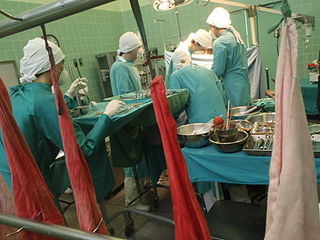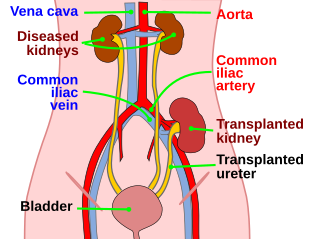Related Research Articles

Organ donation is the process when a person allows an organ of their own to be removed and transplanted to another person, legally, either by consent while the donor is alive or dead with the assent of the next of kin.

Organ transplantation is a medical procedure in which an organ is removed from one body and placed in the body of a recipient, to replace a damaged or missing organ. The donor and recipient may be at the same location, or organs may be transported from a donor site to another location. Organs and/or tissues that are transplanted within the same person's body are called autografts. Transplants that are recently performed between two subjects of the same species are called allografts. Allografts can either be from a living or cadaveric source.
The Uniform Anatomical Gift Act (UAGA), and its periodic revisions, is one of the Uniform Acts drafted by the National Conference of Commissioners on Uniform State Laws (NCCUSL), also known as the Uniform Law Commission (ULC), in the United States with the intention of harmonizing state laws between the states.
Prior to the introduction of brain death into law in the mid to late 1970s, all organ transplants from cadaveric donors came from non-heart-beating donors (NHBDs).

Kidney transplant or renal transplant is the organ transplant of a kidney into a patient with end-stage kidney disease (ESRD). Kidney transplant is typically classified as deceased-donor or living-donor transplantation depending on the source of the donor organ. Living-donor kidney transplants are further characterized as genetically related (living-related) or non-related (living-unrelated) transplants, depending on whether a biological relationship exists between the donor and recipient.

Organ transplantation in China has taken place since the 1960s, and is one of the largest organ transplant programmes in the world, peaking at over 13,000 liver and kidney transplants a year in 2004.
Organ procurement is a surgical procedure that removes organs or tissues for reuse, typically for organ transplantation.
Certain fundamental Jewish law questions arise in issues of organ donation. Donation of an organ from a living person to save another's life, where the donor's health will not appreciably suffer, is permitted and encouraged in Jewish law. Donation of an organ from a dead person is equally permitted for the same purpose: to save a life. This simple statement of the issue belies, however, the complexity of defining death in Jewish law. Thus, although there are side issues regarding mutilation of the body etc., the primary issue that prevents organ donation from the dead amongst Jews, in many cases, is the definition of death, simply because to take a life-sustaining organ from a person who was still alive would be murder.
Organ trade is the trading of human organs, tissues, or other body products, usually for transplantation. According to the World Health Organization (WHO), organ trade is a commercial transplantation where there is a profit, or transplantations that occur outside of national medical systems. There is a global need or demand for healthy body parts for transplantation, which exceeds the numbers available.
In December 2006, The UK Government set up the Organ Donation Taskforce to identify barriers to organ donation and recommend actions needed to increase organ donation and procurement within the current legal framework.
Many different major religious groups and denominations have varying views on organ donation of a deceased and live bodies, depending on their ideologies. Differing opinions can arise depending on if the death is categorized as brain death or cease of the heartbeat. It is important for doctors and health care providers to be knowledgeable about differentiating theological and cultural views on death and organ donations as nations are becoming more multicultural.
"Harvest" is the 14th episode of the second season of the American television show Numbers. Inspired by a Christian Science Monitor article about organ tourists, people who travel to a different country to give their organs for money, and an algorithm developed in the United States, the episode features Federal Bureau of Investigation (FBI) agents and mathematicians attempting to locate a missing organ tourist before she is killed.
The Declaration of Istanbul was created at the Istanbul Summit on Organ Trafficking and Transplant Tourism held from 30 April to 1 May 2008 in Istanbul, Turkey. The Declaration clarifies the issues of transplant tourism, trafficking and commercialism and provides ethical guidelines for practice in organ donation and transplantation. Since the creation of the declaration, over 100 countries have endorsed the principles. Some nations have subsequently strengthened their laws against commercial organ trade, including China, Israel, the Philippines, and Pakistan.

MOHAN Foundation is a not-for-profit, registered non-government charity organisation in India that works in the field of deceased organ donation and transplantation. MOHAN is an acronym for Multi Organ Harvesting Aid Network. It has offices in Chennai, Hyderabad, Bengaluru, Delhi, Mumbai, Chandigarh, Nagpur, Jaipur and information centers at Kerala and Imphal.
Allegations of forced organ harvesting from Falun Gong practitioners and other political prisoners in China have raised concern within the international community. According to a report by former lawmaker David Kilgour, human rights lawyer David Matas and journalist Ethan Gutmann of the Victims of Communism Memorial Foundation, political prisoners, mainly Falun Gong practitioners, are being executed "on demand" in order to provide organs for transplant to recipients. Reports have said that organ harvesting has been used to advance the Chinese Communist Party's persecution of Falun Gong and because of the financial incentives available to the institutions and individuals involved in the trade. A report by The Washington Post has disputed some of the allegations, saying that China does not import sufficient quantities of immunosuppressant drugs, used by transplant recipients, to carry out such quantities of organ harvesting.
Organ donation is when a person gives their organs after they die to someone in need of new organs. Transplantation is the process of transplanting the organs donated into another person. This process extends the life expectancy of a person suffering from organ failure. The number of patients requiring organ transplants outweighs the number of donor organs available.
The current law in Ireland requires the potential donor to opt in to becoming an organ donor. However, it is ultimately up to their family to make the decision whether or not the person is allowed to donate their organs after they die.
Human organ trafficking in Egypt, as of 2014 mainly practiced in Cairo and the Sinai Peninsula, includes organ harvesting with induced consent, coercion, and outright theft. Egypt has become the largest hub of organ transplant in North Africa as one of the few countries that prohibited organ donation from deceased donors until 2010, with over 500 kidney transplant operations a year and the majority of these organs come from living donors. Sources in the organ trafficking process mainly come from vulnerable populations including domestic rural migrants, undocumented asylum seekers and informal labor. The emergence of cultural and religious increase in organ trade and transplant tourism contribute to the rocketing demand for organ trafficking market in Egypt. Human organ trafficking poses both physical and mental health consequences for victims. Although Egypt has been gradually updating legal frameworks to combat organ trafficking, the regulation has failed in reality protecting survivors and governing transplant professionals.
Organ transplantation in the Indian state of Tamil Nadu is regulated by India's Transplantation of Human Organs Act, 1994 and is facilitated by the Transplant Authority of Tamil Nadu (TRANSTAN) of the Government of Tamil Nadu and several NGOs. Tamil Nadu ranks first in India in deceased organ donation rate at 1.8 per million population, which is seven times higher than the national average.
Organ donation in India is regulated by the Transplantation of Human Organs and Tissues Act, 1994. The law allows both deceased and living donors to donate their organs. It also identifies brain death as a form of death. The National Organ and Tissue Transplant Organisation (NOTTO) functions as the apex body for activities of relating to procurement, allotment and distribution of organs in the country.
References
- ↑ "Israel's Organ Donation Law". Archived from the original on 2010-01-30. Retrieved 2010-01-30.
- ↑ Efrati, Ido (2016-01-28). "Organ Donations and Transplants in Israel Climb 30%". Haaretz.
- ↑ Scot Klarenbach; et al. (January 16, 2006). "A Review of the Economic Implications of Living Organ Donation: Donor Perspectives and Policy Considerations" (PDF). Retrieved 2009-08-29.
- 1 2 Knesset approves organ donation law
- 1 2 Organ Donation: Legal, But Still Controversial Archived April 16, 2008, at the Wayback Machine
- 1 2 Guttman, Nathan (2009-08-05). "Kidney Donation Scandal Sparks New Debate Over Specter's Organ Legislation". The Forward.
- ↑ Organ donation and transplantation, Orit Brawer Ben-David, p.143, Greenwood Publishing Group, 2005
- ↑ Organ donation to get halachic approval
- ↑ "Shimon Peres wanted Israelis to be organ donors — like him".
- ↑ Levi, Yaakov (2007-12-02). "Compensation for organ donation". Haaretz.
- ↑ http://www.health.gov.il/English/Topics/organ_transplant/Pages/kartis_ADI.aspx Israel Ministry of Health - ADI
- 1 2 Rohter, Larry (2004-05-23). "THE ORGAN TRADE: A Global Black Market; Tracking the Sale of a Kidney On a Path of Poverty and Hope". New York Times. Retrieved 2010-05-20.
- ↑ Scheper-Hughes, Nancy (July 2001). "The organ of last resort". UNESCO Courier. Archived from the original on 2002-06-13.
- ↑ Rohter, Larry (2004-05-23). "THE ORGAN TRADE: A Global Black Market; Tracking the Sale of a Kidney On a Path of Poverty and Hope". New York Times. Retrieved 2010-05-20.
- ↑ Aftonbladet: "Our sons are plundered of their organs"
- ↑ Boudreaux, Richard (2009-08-24). "Article about organ harvesting sparks Israel-Sweden tiff". Los Angeles Times . Retrieved 2010-02-21.
- ↑ Friedman, Matti (19 August 2009). "Israel furious over Swedish newspaper article". Associated Press. Retrieved 19 August 2009.
- ↑ [ dead link ]
- ↑ "Israel harvested organs without permission, officials say - CNN.com". CNN. 2009-12-21. Retrieved 2010-05-20.